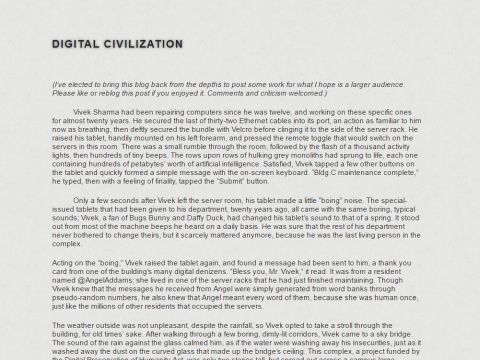
Title: Turn of a Friendly Card
Publication: Self-published (Wordpress)
Genre: Non-fiction/analysis/journal
Date: Since 2017
I spent 2017 almost too busy minding children to do anything of note, but somehow made the time to at least keep up on writing, about a rediscovered love for playing cards of unusual designs. On the Friendly Card (named for one of my favorite albums), I examine specific decks, muse about ways playing cards can be useful besides playing games, and examine how impactful solitare has been on the world of computing.
Quote:
Why does one play solitaire? What keeps a player coming back? If a card game is in the same league as a set of math problems, why not just do the math problems, instead of toting around a deck, or installing any of thousands of solitaire apps on your phone? I’d argue it’s the satisfaction of having finished. Maybe that’s not good enough for those folks who must win. A player might not stop playing until they’ve won a round, and then they might be so exhilarated with the win that they decide to play another. It can be addicting. It can require immense self-control to play only as long as is needed.Read more at Turn of a Friendly Card

Title: Wolfenstein
Publication: Hardcore Gaming 101
Genre: Historical analysis/non-fiction
Date: 2015-Jan (originally published)
An in-depth historical look at the Wolfenstein series of video games, written on commission for Hardcore Gaming 101. The purpose of the piece was not to review the games, but to observe their legacy and influence on modern video gaming, and why a reader might find it worthwhile to revisit the games in question.
Quote:
While many of Wolfenstein's gameplay conventions were nothing new to gaming in general, many of them having appeared in Carmack's previous game, Catacomb 3-D; the presentation and sheer speed of gameplay was unprecedented. No longer were players confined to the snail's pace of Catacomb's wizard protagonist; players were now capable of running at breakneck speeds through the castle, clearing rooms in record time with their chain guns. It wasn't always like this, though. It has been explained in the past, by both Carmack and Romero, that Wolfenstein 3D's gameplay originally took more after Silas Warner's two Wolfenstein games on the Apple II, with players needing to spend time moving dead bodies to prevent enemies from being alerted to the player's presence. It is unclear whose decision it was to remove these stealth elements, but the reasoning was clear enough: they slowed the game down too much. Players wanted to get in there and shoot things, not waste time dragging around dead Nazis.Read more at Hardcore Gaming 101

Title: Grinding the Rumor Mill
Publication: Self-published
Genre: Historical analysis/non-fiction
Date: 2016
The rumor mill has been an important part of the video games industry for a very long time, but the thing about rumors is that they aren't always right. But they have to come from somewhere. In March of 2016, I made it my goal to read the rumor mill columns in a handful of old video game magazines to see if I could figure out where the rumors were coming from, what they wound up becoming, and what could have been. I intended for this site to have a more casual tone than my work for Hardcore Gaming 101.
Quote:
In light of this, everybody expected Nintendo to announce that the GameCube would also have a DVD drive, especially given how the Dreamcast suffered disc space limitations towards the end of its life cycle (with killer-app Shenmue coming on four GD-ROMs). But Nintendo had, perhaps, tipped their hand too early; the GameCube was revealed in August of 2000, mere months before the PS2 launch, sporting what Nintendo called a "mini-DVD" drive that would not fit full-size discs of any type. By the time Nintendo noticed the effect that DVD playback was having on Sony's sales numbers, it was too late to redesign the GameCube to accommodate the larger drive. Or was it?Read more at Grinding the Rumor Mill

Title: Digital Civilization
Publication: Self-published
Genre: Science-Fiction
Date: 2015-May-15
In an unspecified distant future, where "humanity" lives not in houses and buildings, but on servers and networks, a lonely network technician begins to wonder about whether the "people" he interacts with can really be called people, and the real significance of his role outside the network.
Quote:
“My home is here,” was Angel’s reply. “I suppose it’s a matter of perspective. I could choose to believe that I lived in a house, but the house would not really be a house, would it?” Vivek continued to puzzle over the thought. He supposed that all of the AIs technically had homes, as simple addresses stored on the servers. If an AI needed to know where another AI was, the server itself would know in which sector of which hard drive they lived. Some AIs were probably more comfortable in the thought that their sector was a house, just as others might still consider themselves homeless, merely for the sake of being able to say so. They were computers, after all; being able to change their living circumstances was as simple as changing a few bytes, wasn’t it?Read more at Weasel's Writing via Tumblr